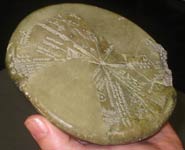[/caption]
Ephemerides is the plural form of ephemeris; one ephemeris, two (three, four, …) ephemerides. Why such a strange word? Why not ‘ephemerises’? Because of its Greek-via-Latin origin, and because it’s a word rarely used outside an academic/technical setting (there are only a few other words in English which form plurals in this way, one is iris -> irides). An ephemeris is a table (or similar) giving the position in the sky of astronomical objects, at a particular time (or set of times).
The most common ephemerides are those of solar system bodies, such as the planets, asteroids, and comets; ephemerides of greatest public interest are those of solar eclipses. For amateur astronomers, ephemerides giving eclipses, occulations, and transits – of asteroids, the Galilean moons, eclipsing binaries, exoplanets, etc – are of particular interest.
Waaay back when, ephemerides took a very long time to calculate, because all calculation was done by hand; today there are free apps and software packages you can download that will generate ephemerides for you, even ones of entirely fictional things such as settings for a sci-fi novel.
And here’s a fun fact: you can generate half-way decent ephemerides of the classical planets (Mercury, Venus, Mars, Jupiter, Saturn), the Moon, and of solar eclipses, using a heliocentric, Ptolemaic model! Today, for high accuracy – especially over centuries and millennia – ephemerides of Mercury, the Moon, etc require gravity to be modeled using General Relativity (GR), rather than Newtonian mechanics. And accurate ephemerides for Pioneer 10 and 11? Well, even GR is not enough … you have to model the Pioneer anomaly!
There two NASA websites nicely bracket ephemerides: Ephemeris (the briefest of introductions), and the HORIZONS web interface (for precision ephemerides). Ephemerides and Orbital Elements is the IAU Minor Planet Center’s site for the most up-to-date ephemerides, and Description of JPL Solar System Ephemeris (NRAO) explains some of the subtleties involved in generating, and interpreting, ephemerides.
Some of the many Universe Today articles which reference ephemerides: Observing Near-Earth Asteroid TU24, Gravity Anomaly Challenges MESSENGER Mission, and Newly Discovered Asteroid 2009 FH to Buzz the Earth Tonight.
Constellations, an Astronomy Cast episode very relevant to ephemerides; check it out!

